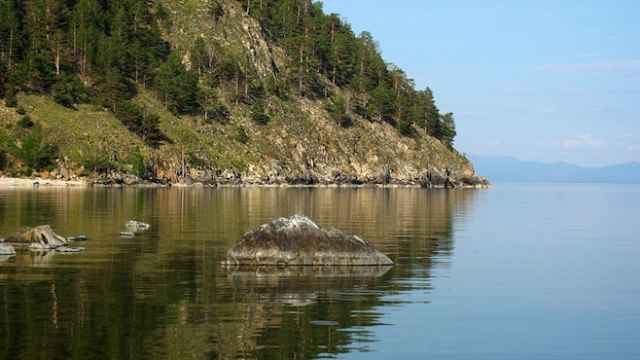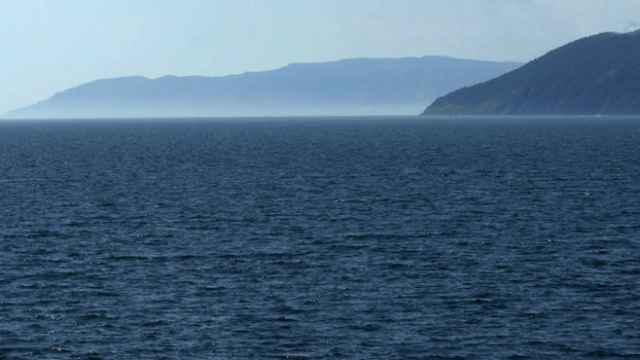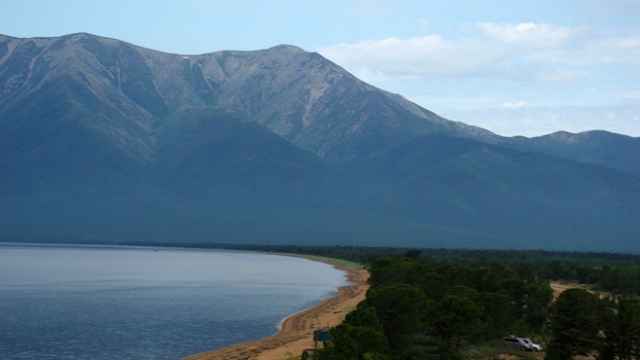Local residents and environmentalists have appealed to Russian President Vladimir Putin to stop the planned construction of a radioactive-waste processing facility near Lake Baikal in eastern Siberia, a project critics say could endanger a unique ecosystem.
The fallout from a potential accident at the facility, slated to be built in the village of Shiryayeva in the Irkutsk region, could be devastating for the area's environment, a physics professor at Irkutsk State University, Sergei Korenblit, told The Moscow Times on Wednesday.
The petition addressed to Putin on the Change.org website to scrap the construction had garnered more than 34,430 signatures by Wednesday afternoon. It seeks about 600 more signatures.
The waste-processing project envisages transporting 35,000 tons of radioactive metal waste from a uranium enrichment plant in Angarsk to Shiryayeva, according to a report by independent environmental watchdog Bellona. The village is located some 35 kilometers from Irkutsk, the regional academic and industrial center, and about 100 kilometers from the Baikal shore.
The waste would be carried from the Angarsk Electrolysis Chemical Plant by trucks over a bridge in Irkutsk — an endeavor also posing “substantial risks” to the city, the Change.org petition said.
“It's easier to prevent a hazardous industry than to later spend many years trying to shut it down,” the petition read. “Lake Baikal has already been through this with the Baikal pulp and paper mill, which has spoiled its ecology for many years to come.”
Another issue of significant concern to critics of the project is whether the plant in Shiryayeva would only process waste from the Angarsk plant — as proponents of the project claim — or would become a site for processing radioactive materials brought in from other regions, and possibly from overseas.
Critics fear that the choice might eventually be determined by the search for greater profits on the part of companies involved in waste processing, Korenblit said.
A public hearing held in Shiryayeva this summer voted against the construction, and called for processing the radioactive metals in Angarsk, where the waste is produced.
But the regional Environmental Ministry's spokeswoman Olga Kirilova said the hearing held in Shiryayeva appeared invalid, because the issue should have been discussed by the Irkutsk region as a whole, the Change.org petition said. Construction is scheduled to go ahead as planned.
The facility's projected capacity stands at 2,000 tons of waste per year — meaning that processing the initial 35,000 tons of waste that is expected to be transported from Angarsk would take over 17 years — while more waste from the Angarsk plant is expected to arrive and pile up in the meantime, Bellona said in a report.
Shortly after winning an election last month, Irkutsk regional governor Sergei Levchenko said he would cancel the construction and shut down the Angarsk Electrolysis Chemical Plant, turning it into a “warehouse” for the waste that had accumulated there, the regional NewsBabr website has reported.
But the Angarsk plant's management disagreed, saying that the governor had overstepped his authority, and any decision to shut down a federal facility can only be made by Russia's president, NewsBabr reported.
The chief of the Irkutsk branch of RosRAO, a radioactive management agency that spearheads the planned construction, claimed at the summer hearing that the project was intended “for the good of the Irkutsk region,” Bellona reported.
“This is our waste, it has to be reprocessed here,” the RosRAO regional chief, Anatoly Pavlov, was quoted as saying. “Our country has set us the task of getting rid of waste. Thankfully, the Irkutsk region has such an enterprise, which is RosRAO.”
But proponents of the construction have failed to demonstrate why waste processing could not continue at the Angarsk plant, which had been managing its waste for a decade, according to Korenblit, who took part in the hearing.
Lake Baikal is the largest freshwater lake in the world by volume, and also the world's deepest, clearest and oldest, at 25 million years. The lake has a maximum depth of 1,642 meters and holds about one-fifth of the world's unfrozen surface fresh water.
But the lake, a UNESCO World Heritage site, has suffered substantial environmental harm ever since the pulp and paper mill opened on its shores on 1966.
Continuing pollution is reducing the lake to a “swamp,” with the spread of invasive species of algae that thrive on liquid waste — including fuel and excrement — hundreds of tons of which are dumped into the lake each year, according to findings released by the Baikal Environmental Wave group last year.
A Message from The Moscow Times:
Dear readers,
We are facing unprecedented challenges. Russia's Prosecutor General's Office has designated The Moscow Times as an "undesirable" organization, criminalizing our work and putting our staff at risk of prosecution. This follows our earlier unjust labeling as a "foreign agent."
These actions are direct attempts to silence independent journalism in Russia. The authorities claim our work "discredits the decisions of the Russian leadership." We see things differently: we strive to provide accurate, unbiased reporting on Russia.
We, the journalists of The Moscow Times, refuse to be silenced. But to continue our work, we need your help.
Your support, no matter how small, makes a world of difference. If you can, please support us monthly starting from just $2. It's quick to set up, and every contribution makes a significant impact.
By supporting The Moscow Times, you're defending open, independent journalism in the face of repression. Thank you for standing with us.
Remind me later.





